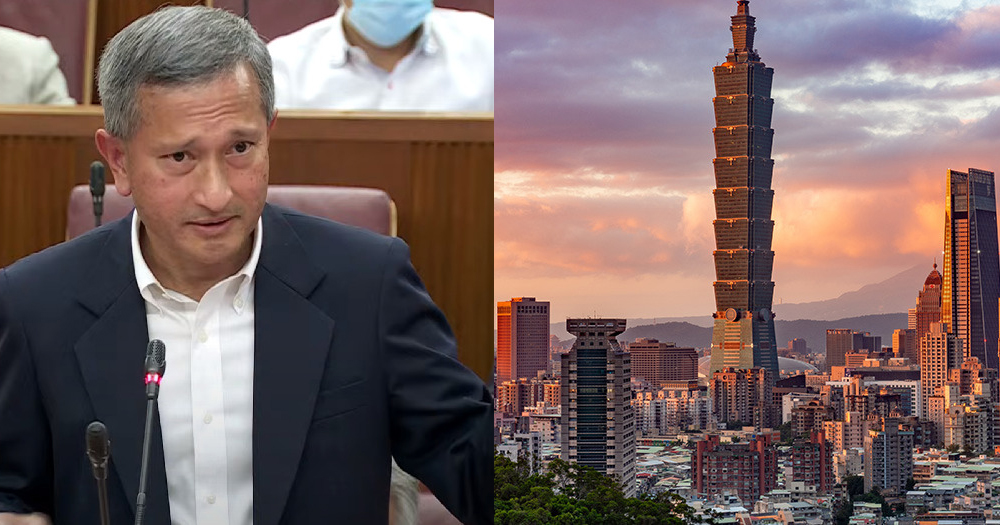Follow us on Telegram for the latest updates: https://t.me/mothershipsg
The Taiwan Strait has become a more dangerous flashpoint, Foreign Affairs Minister Vivian Balakrishnan said in Parliament on Feb. 27.
For China, Taiwan is a part of it and the island's independence is an "absolute red line", he noted at the Ministry of Foreign Affairs' (MFA) Committee of Supply (COS) debates.
However, to the U.S. and some other western countries, Taiwan is a vibrant democracy which needs to be protected like Ukraine, which is an independent country and UN member.
Meanwhile, within Taiwan itself, more and more people are identifying as exclusively Taiwanese, he pointed out further.
Military conflict is not being sought for over Taiwan but there is risk of missteps
The minister added that while neither the U.S. nor China are seeking a military conflict over Taiwan, "missteps or mishaps" can easily trigger a cycle of tit-for-tat actions that can spiral out of control.
He highlighted:
"A conflict over Taiwan will have global repercussions, and a much more direct impact on Singapore, than the ongoing war in the Ukraine.
Not only is Taiwan much closer to us geographically but our ties with the U.S., with China and Taiwan, are much stronger and deeper compared to our ties with Russia and Ukraine."
Singapore will not escape impact of U.S. and China reducing interdependence
In addition, there is a "real risk" that steps taken by the U.S. and China to reduce mutual interdependence will adversely impact the global economy, Vivian said.
Singapore will not escape the spillover consequences, he added.
"Our open economy is highly dependent on doing business with the world, and we have benefitted greatly from being a vital node in globalised supply chains," Vivian noted.
The U.S. is Singapore's largest foreign investor, as well as the top trading partner for services.
At the same time, Singapore is one of the largest investors in China, which is also Singapore's top trading partner in goods.
Vivian said:
"If the U.S. and China get along, then Singapore will be ideally positioned to prosper. On the other hand, if things go wrong between them, these strengths can quickly turn into vulnerabilities for Singapore."
Both countries are locked in competition with each other
Both countries are now locked in an "intense and sharpening" strategic competition across multiple domains, according to Vivian.
The U.S. has identified computing-related technologies, biotech, and clean tech as force multipliers throughout the technological ecosystem, and emphasised leadership in each of these as a national security imperative, he elaborated.
Consequently, the U.S. has decided it needs to maintain as large a lead as possible over China in these fields, Vivian added.
"To this end, the U.S. is implementing systematic measures, including export restrictions on advanced semiconductor technology, and they are in fact ongoing discussions on an outbound investment screening mechanism," he said.
As for China, it is determined to achieve greater self-reliance and to prevent itself from being held to ransom, he said.
China is therefore progressively onshoring segments of its supply chains in the tech sector.
"Collectively, these moves by both sides increase the danger of a grand bifurcation in the technological and economic systems, a deepening of tensions and elevation of mutual suspicions. And these have profound implications for the rest of the world."
Both the U.S. and China wish to avoid conflict but there is a fundamental lack of trust
As for the nature of the relationship between the U.S. and China, Vivian described it as such:
"A fundamental deficit of strategic trust, rooted in incompatible worldviews and aggravated by their domestic political pressures. Both sides wish to avoid conflict but neither side can afford to be seen as weak."
Within China, there is a growing body of opinion that the U.S. is a superpower in terminal decline and that it is determined to contain China's rise at all costs, he said.
Meanwhile, the U.S. has seen a "deep shift" in attitudes towards China.
According to Vivian, the U.S. believes that China:
"...is the "only competitor" with both the intent to reshape the international order and increasingly, the economic, diplomatic, military, and technological power to advance that objective”.
It is now a "settled bipartisan" view in the U.S. that China's rising power is inimical to American interests and values.
The "balloon incident" is reflective of such a dynamic between the two countries, he added, as it exacerbated suspicions and tensions amidst strong domestic reactions on both sides, and was a setback in relations between the two countries.
"But I'm glad that Secretary of State Antony Blinken and State Councillor Wang Yi did meet in Munich earlier this month, and it shows that both sides recognise the necessity for dialogue and diplomacy, especially at times like this," he said.
Effective communication between both countries is therefore vital to manage risks in global affairs, Vivian reiterated.
"Both sides need to establish guardrails, as hardened, negative views against the 'other side' increasingly become structural features of geopolitical discourse in both the U.S. and China."
Top screenshot left image by MCI/Singapore YouTube, right image from Timo Volz via Unsplash
If you like what you read, follow us on Facebook, Instagram, Twitter and Telegram to get the latest updates.
